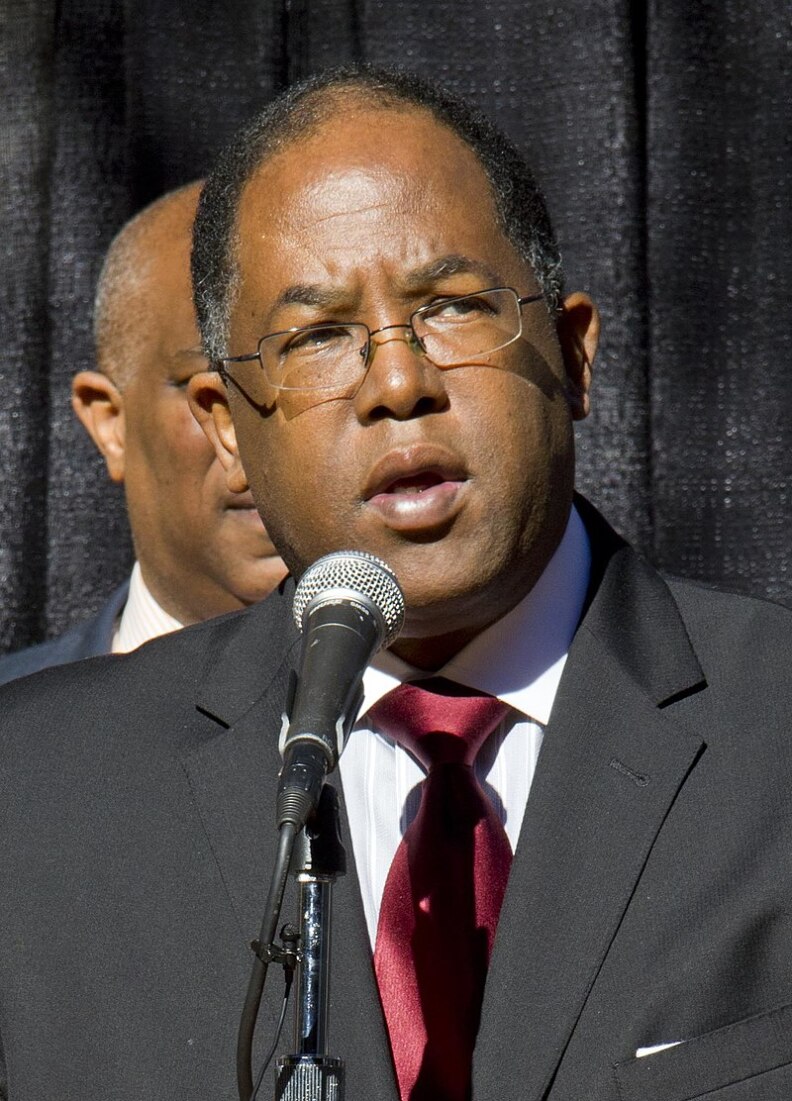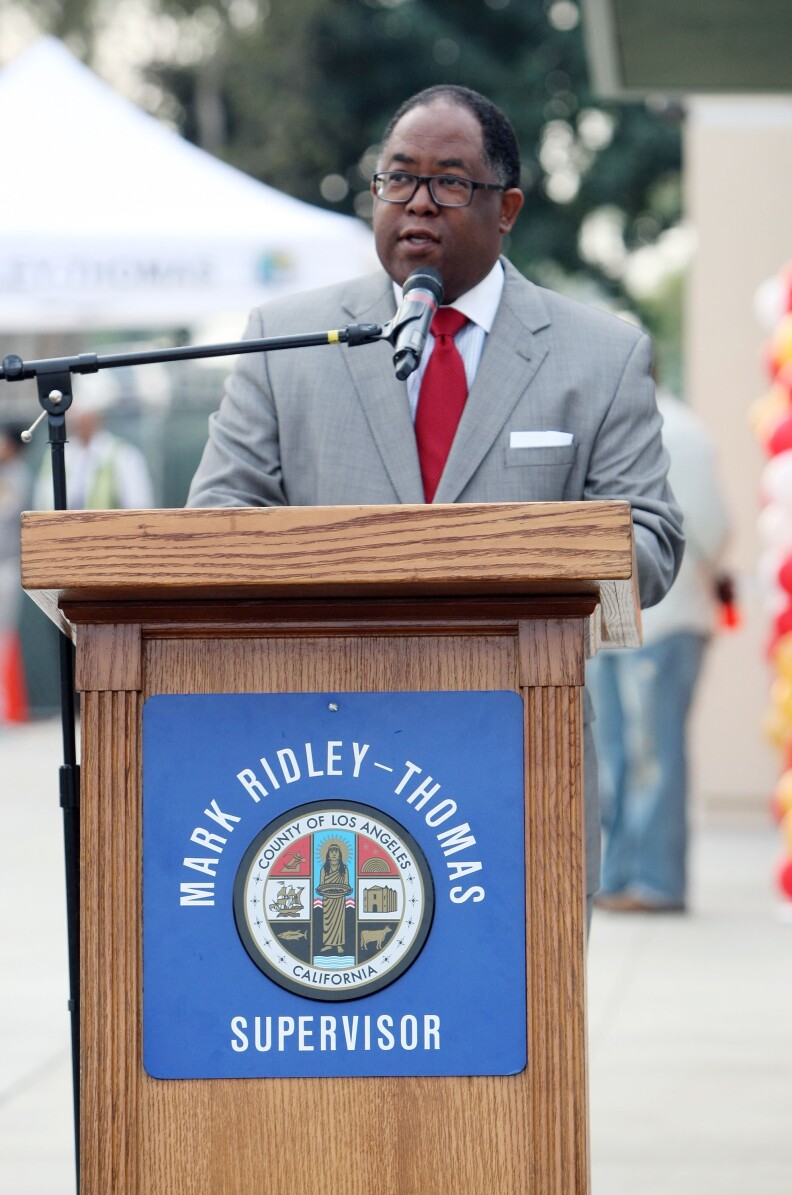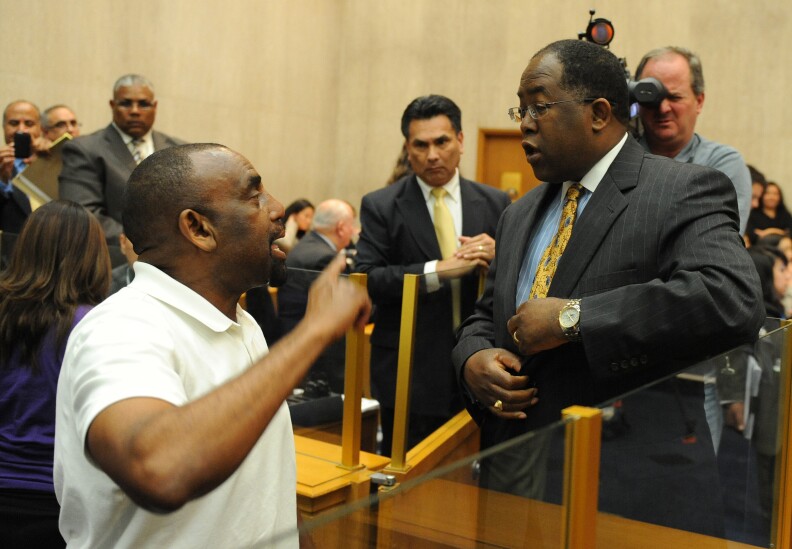Mark Ridley-Thomas, whose long political career involved representing South Los Angeles on the City Council, the County Board of Supervisors and in the State Legislature, was sentenced Monday to 42 months in federal prison and ordered to pay a $30,000 fine for his conviction on corruption charges.
While acknowledging that Ridley-Thomas has done “an enormous amount of good” for the community over three decades of public service, U.S. District Court Judge Dale Fischer said in handing down the sentence that Ridley-Thomas has shown “no remorse” and that “the entire community has been victimized.”
Fischer added that deterrence of public corruption “is an extremely important factor in this case.”
In a statement to the court, Ridley-Thomas said his actions — “and the fallout from those actions — have hurt my family, beginning with my wife of 44 years who should never have had to go through an ordeal like this. I apologize to her with every breath and with my whole heart. And I apologize to my sons, my daughter-in-law and grandchildren, as well as other family members whose lives have been disrupted and traumatically impacted.”
Ridley-Thomas, 68, has appealed his conviction. In his statement, he said he believed it was “fair to say that this case exists somewhere between what is clearly legal conduct on one end, and clearly illegal conduct on the other. In between there is a line that distinguishes actions that are illegal — and actions that may be ill-advised, but NOT illegal.”
Mark Ridley-Thomas Allocution Statement
-
Good morning, Your Honor, I would like to thank you for the opportunity to address the Court. I’ve had a full and intense twenty months, to reflect on the circumstance in which I find myself. It is true that I have chosen to exercise my constitutional rights as a citizen to offer the best possible defense for myself.
-
But I feel that it’s important, Your Honor, to make it clear to you that I in no way want to convey anything but respect for you, and for this Court. Further, I want to assure you that when this is completed I will accept the outcome of this judicial process and give full and respectful compliance in accordance with the law.
-
Your Honor, I believe it’s fair to say that this case exists somewhere between what is clearly legal conduct on one end, and clearly illegal conduct on the other. In between there is a line that distinguishes actions that are illegal — and actions that may be ill-advised, but NOT illegal.
-
While I definitely disagree as to whether I crossed that line into illegal conduct, I acknowledge with clarity where I belonged was at the end of the spectrum where there would be little, if any, question of even the appearance of unlawfulness. The very perception that I deviated from proper conduct in this matter is truly distressing as well as harmful, and I deeply regret it.
-
My actions — and the fallout from those actions — have hurt my family, beginning with my wife of 44 years who should never have had to go through and ordeal like this. I apologize to her with every breath and with my whole heart. And I apologize to my sons, daughter-in-law and grandchildren, as well as other family members whose lives have been disrupted and traumatically impacted.
-
Additionally, the anguish that I feel causes me to say I’m so sorry to all of my constituents, colleagues and employees who have believed in me for many years, but who may now have doubts. I sincerely apologize to them not only for playing a role in bringing about those doubts — but also for no longer being able to be there for them in service. I can only trust and believe that the future will afford me the opportunities to continue to find ways to serve them and their families, to remove doubt and to restore faith.
-
Your Honor I give you, and my former constituents, on all those here today and all those here today my pledge that I will find a way to continue to learn from this devastating experience, to emerge from it as a more conscientious person, and to go forward once this is behind us with humility, with renewed commitment to service and with undaunted hope for a purposeful life dedicated to the communities who rightfully expect and deserve the very best of me.
Judge Fischer ordered Ridley-Thomas to surrender by Nov. 13. It was unclear whether Ridley-Thomas will be allowed to stay out of prison while he appeals his case.
Speaking on behalf of his family, Ridley-Thomas’ son Sinclair said, “We are deeply disappointed.” Ridley-Thomas’s attorney, Galia Amram, added, “This whole case has been devastating for the supervisor.”
A jury found Ridley-Thomas guilty of corruption
In March, a jury found the former county supervisor guilty of conspiring to support a county contract for USC in exchange for one of the school’s deans providing his son a full scholarship and faculty job. The dean also helped funnel money from a Ridley-Thomas political fund to one operated by his son through the university.
To be sure, there have been harsh words for Ridley-Thomas in the wake of his conviction.
Ridley-Thomas “defrauded the people of the county,“ U.S. Attorney Martín Estrada said after the jury handed down the verdicts. “Any time a politician engages in corruption and breaches his duty of trust to the public, it is a great crime that must be brought to justice.”
Hans Johnson, president of the East Area Progressive Democratic Club, wrote in the L.A. Daily News, “The guilty verdicts mark a defeat for the public-relations campaign by Ridley-Thomas and his allies leading up to his trial that succeeded in muting criticism and, for some, muddying the waters over the federal charges of self-dealing he faced,”
Johnson also likes to point out that Ridley-Thomas wasn’t always progressive — he voted to keep a Christian cross on the official L.A. County seal, albeit for historical reasons.
Ridley-Thomas graduated from Manual Arts High School and earned a master’s degree in religious studies from the now-closed Immaculate Heart College in L.A. Later, he earned a Ph.D. in social ethics and policy analysis from USC.
Looking back on MRT’s career
The TV camera pans the crowd of protesters outside Parker Center, the old LAPD headquarters on Los Angeles Street. It is 1991, three days after the beating of Rodney King.
Mark Ridley-Thomas is among them.
“His time has ended,” he declares of the LAPD’s notorious leader at the time, Chief Daryl Gates. Hours earlier, Ridley-Thomas was part of a delegation that met with Gates during a “candid exchange” with “sharp disagreement.”
“We wanted to look him in the eye and make it clear that he knew where we stood.”
For more than four decades, Ridley-Thomas was in the middle of some of the biggest political battles in L.A. He didn’t limit himself to local issues.
Audio from the Pacifica Radio Archives features Ridley-Thomas at a 1980s-era protest outside a Century City fundraiser for President Ronald Reagan. He rails against Reagan’s support of the apartheid regime in South Africa and against the U.S.-backed Salvadoran government’s human rights abuses.
“We have to say no to apartheid as well as say no to intervention in Central America,” he shouts into a bullhorn.
Legacy of progressive activism
But many say Ridley-Thomas has been one of the city’s most progressive leaders, and that his conviction shouldn’t mean forgetting all he did.
Mayor Karen Bass knew Ridley-Thomas back in the 1980’s, when he was executive director of the local chapter of the Southern Christian Leadership Conference — the organization Martin Luther King, Jr. started in 1957.
“For decades, Mark Ridley-Thomas has been a champion for our city, a civil rights activist, a thought leader, and a policy maker who made a real impact on this city,” Bass said after Ridley-Thomas’ conviction.

Los Angeles County Board Supervisor Mark Ridley-Thomas answers the media’s questions in USC’s Associates Park on Jan. 19, 2013.
(Rosa Trieu/Neon Tommy
/
Wikimedia Commons)
On the website of Community Coalition, the organization Bass helped found in 1991, Ridley-Thomas is quoted recalling discussions with her and others about alternative ways to approach the crack epidemic ravaging South L.A. at the time.
“It began in the late ‘80s as a conversation about how we could more intelligently, humanely and effectively respond to this crisis,” he said.
In his early work, Ridley-Thomas played an instrumental role in building relationships in South L.A. as it turned from predominantly African American to Latino, said former Mayor Antonio Villaraigosa, who worked with him on the issue during that time.
“He thought early on that it was important that we come together and focus on our commonalities while also discussing differences,” said Villaraigosa, who co-chaired the Latino-Black Roundtable with Ridley-Thomas. He said at one point the two appeared together on the cover of LA Weekly with the headline, “The New Progressives.”
MRT’s City Council career
Ridley-Thomas was elected to the City Council representing South L.A.’s eighth district. He served from 1991 to 2003.
In one of his first major acts, Ridley-Thomas established what he called an Empowerment Congress to encourage community participation in governance and connect people to city services. The group has endured. Its annual meetings attract more than 1,000 people. It helped inspire the city’s neighborhood council system.

Portrait of Councilman Mark Ridley Thomas, taken at an NFL News Conference held at Macy’s Plaza, downtown Los Angeles on Aug. 9, 1999.
(Gary Leonard
/
Gary Leonard Collection/LAPL)
Jaime Regalado, the former head of the Pat Brown Institute at Cal State L.A., recalls how Ridley-Thomas supported a controversial gang intervention training program that used former gang members to help young people.
“There’s a whole history of things that he supported that very few politicians would touch,” said Regalado.
Ridley-Thomas was ahead of his time when it came to funding programs to combat sexual and domestic violence, according to Patti Giggans, executive director of the nonprofit Peace Over Violence.
“Mark was very committed to the issue of preventing violence against women and girls way before #MeToo,” she said. “He was one of the few men who stood up for survivors at the time.”
‘Consummate tactician and strategist’
Ridley-Thomas played a crucial role in the building of Staples Center, now called Crypto.com Arena, said John Semcken of Majestic Realty. At Majestic, Semcken was responsible for the development of the arena in the late 1990s.
Ridley-Thomas helped win the support of reluctant fellow council members, including Joel Wax, who made a name for himself by making ever-increasing demands of the developers, according to Semcken. “Mark sat me down and said, ‘You need to give him a win because he can’t back out,’” he recalled.
They cut a deal.
“Staples Center never would have been built if it weren’t for Mark Ridley-Thomas,” he said.
Semcken called Ridley-Thomas “the most effective politician I have ever met in my life, and I have met a lot of them.”
“He’s the consummate tactician and strategist,” said Villaraigosa.
A pivotal seat: the L.A. County Board of Supervisors
Ridley-Thomas spent four years in the state legislature before returning to L.A. to run for a seat on the county Board of Supervisors in 2008. He served the maximum of 12 years.
On the board, Ridley-Thomas fought to reform the Department of Children and Family Services, authored the county’s minimum wage ordinance, and for years was the lone voice in favor of the creation of a civilian board to watchdog the Sheriff’s Department.

Mark Ridley-Thomas Los Angeles County Board of Supervisors attends the BAFTA LA opening of the Helen Keller Park Screening Room at Helen Keller Park on Dec. 10, 2014 in Los Angeles.
(David Buchan
/
. AsiaPac)
“He was our only champion,” said Mark-Antony Clayton-Johnson of Dignity and Power Now, a nonprofit that advocates for changes at the department and in the jails. “He was the only one that was willing to push for independent civilian oversight.”
Ridley-Thomas patiently waited for the election of two new members of the five-member board who would support the proposal — then successfully pushed it through.
But perhaps Ridley-Thomas’ crowning achievement as a supervisor was the 2015 reopening of a vastly improved Martin Luther King Jr. Community Hospital in South L.A. It had been closed for nearly a decade after the federal government pulled funding over a series of problems, including controversial patient deaths that earned it the nickname “killer King.”
“He made it clear that he was simply not going to rest until that institution was resurrected,” said Robert Ross, CEO of The California Endowment.
It wasn’t easy. Ridley-Thomas had to maneuver over myriad bureaucratic and political hurdles. He also wanted a project labor agreement that would give job preferences to people who lived nearby and from low-income zip codes. But he couldn’t get anyone on the board to second his motion, according to his longtime chief of staff, Vincent Harris.
Ridley-Thomas convinced the board’s arch-conservative Mike Antonovich to second the motion — just to initiate a debate.
“He did not let ideological differences get in the way,” Harris said. “It illustrated his ability to reach across the lines.”
Ridley-Thomas ended up winning two more votes for an agreement that provided jobs to people who may otherwise never have worked on the project — even though Antonovich voted no.
“He’ll be remembered as one of the stalwarts of not only the African American community but of progressive communities around L.A.,” Regalado said.
Regal — or roughshod?
Over 31 years in public office, Ridley-Thomas almost always wore a tie, was deliberate in his speech, and tended to lecture when he spoke. He could be in love with his own words — more than most politicians. He could be hard to work for, say former staff.
What was to some Ridley-Thomas’ regal and thoughtful stature was to others pompous and arrogant.
“What is viewed as confidence and boldness in a white male is often viewed as arrogance in an African American,” said Ross, who is Black. He noted Ridley-Thomas “didn’t suffer fools gladly.”

An anti-boycott protester (L) confronts Los Angeles County supervisor Mark Ridley-Thomas (R) after they voted 3-2 for Los Angeles County to join a boycott of the state of Arizona, in Los Angeles on June 1, 2010.
(Mark Ralston
/
AFP via .)
Ross declined to comment on the guilty verdicts handed down to Ridley-Thomas, but lamented his loss from the political scene. After his conviction, Ridley-Thomas was required to relinquish the city council seat he won in 2020.
“The injustice to me is Mark Ridley-Thomas being removed from the playing field of civic leadership and civic engagement,” Ross said.
Rabbi Steven Jacobs worked with Ridley-Thomas on numerous issues over the decades.
“Mark has made L.A. a greater city,” he said.
Jacobs said Ridley-Thomas must now figure out a way to contribute in a new capacity, recalling how the legendary violinist Itzhak Pearlman once played on during a concert despite losing one of his strings.
“It’s his duty to continue to make music with what remains,” he said.
What questions or concerns do you have about civics and democracy in Southern California?
Frank Stoltze explores who has power and how they use it at a time when our democratic systems have been under threat.